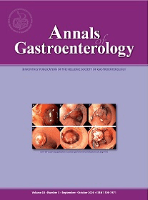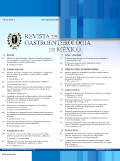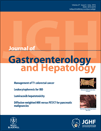
AMERICAN JOURNAL OF GASTROENTEROLOGY
Scope & Guideline
Elevating Gastroenterology: Where Research Meets Impact.
Introduction
Aims and Scopes
- Clinical Guidelines and Treatment Protocols:
The journal frequently publishes clinical guidelines, providing evidence-based recommendations for the management of various gastrointestinal conditions, such as Helicobacter pylori infection and inflammatory bowel disease. - Innovative Research on Gastrointestinal Disorders:
Research articles explore novel approaches to diagnosing and treating gastrointestinal diseases, including the use of biologics, endoscopic techniques, and emerging therapies. - Quality Improvement and Health Outcomes:
The journal includes studies that evaluate health outcomes, quality improvement initiatives, and cost-effectiveness analyses related to gastrointestinal care. - Epidemiology and Public Health:
Research on the epidemiology of gastrointestinal diseases, including their prevalence, risk factors, and the impact of socioeconomic factors on health outcomes. - Technological Advances in Gastroenterology:
The journal highlights advancements in technology, such as artificial intelligence in endoscopy and the use of telemedicine for managing gastrointestinal conditions. - Patient-Centered Research:
A focus on patient-reported outcomes and the psychosocial aspects of gastrointestinal disorders, emphasizing the importance of understanding patient experiences.
Trending and Emerging
- Artificial Intelligence in Gastroenterology:
The integration of artificial intelligence in diagnostics and treatment planning is gaining traction, with studies focusing on its efficacy in improving adenoma detection rates and other clinical outcomes. - Personalized Medicine and Targeted Therapies:
There is a growing emphasis on personalized treatment approaches, particularly in inflammatory bowel disease, highlighting the need for individualized patient care based on genetic and phenotypic characteristics. - Gut Microbiome Research:
Research into the gut microbiome's role in gastrointestinal health and disease is expanding, with studies exploring its impact on treatment responses and disease pathogenesis. - Telemedicine and Remote Monitoring:
The COVID-19 pandemic has accelerated the adoption of telemedicine and remote patient monitoring in gastroenterology, leading to a focus on patient engagement and access to care. - Health Disparities and Social Determinants of Health:
Increased attention is being given to the impact of social determinants on health outcomes in gastroenterology, emphasizing the need to address disparities in care delivery. - Longitudinal Studies on Chronic Conditions:
There is a growing trend towards longitudinal studies that track the progression of chronic gastrointestinal conditions, providing insights into long-term management and outcomes.
Declining or Waning
- Traditional Pharmacological Approaches:
There appears to be a waning focus on traditional pharmacological treatments for gastrointestinal disorders, with a shift towards biologics and personalized medicine. - Basic Science Research:
There has been a noticeable decline in the publication of basic science research in gastroenterology, possibly due to the increasing emphasis on clinical applications and translational research. - Surgical Interventions:
While surgical techniques remain crucial, there is less emphasis on traditional surgical approaches in favor of minimally invasive and endoscopic techniques. - Single-Center Studies:
The journal has shifted towards multicenter and larger-scale studies, indicating a decrease in the publication of single-center research that may lack generalizability. - Conventional Diagnostic Techniques:
A declining interest in conventional diagnostic methods, with a movement towards more advanced imaging and endoscopic techniques, reducing the focus on older diagnostic procedures.
Similar Journals

ACTA GASTRO-ENTEROLOGICA BELGICA
Advancing Gastroenterology through ExcellenceACTA GASTRO-ENTEROLOGICA BELGICA is a prestigious journal dedicated to advancing the field of gastroenterology through the dissemination of high-quality research and clinical insights. Published by UNIVERSITE CATHOLIQUE DE LOUVAIN (UCL), this journal is an essential resource for researchers, healthcare professionals, and students alike, focusing on a wide range of topics including gastrointestinal diseases, treatments, and innovations in clinical practices. While the journal operates under a traditional access model, its impact in the academic community is significant, ensuring that vital research is communicated effectively to stakeholders in Belgium and beyond. With its commitment to academic excellence, ACTA GASTRO-ENTEROLOGICA BELGICA plays a crucial role in fostering high-level discourse and collaboration among experts in the field, ultimately encouraging advancements that improve patient care and outcomes.

Annals of Gastroenterology
Advancing Gastrointestinal Knowledge for Better HealthAnnals of Gastroenterology, published by the Hellenic Society of Gastroenterology, serves as a pivotal platform for advancing the field of gastroenterology, highlighting research that spans across the spectrum of gastrointestinal diseases and treatments. With an ISSN of 1108-7471 and E-ISSN of 1792-7463, this journal has established itself as a reputable source of scholarship since its inception in 2000, converging valuable insights through to 2024. Ranking within Q2 of its category and achieving a respectable 78th position out of 167 in the Scopus rankings, the journal holds a strong presence in the academic community, appealing to researchers, clinicians, and students alike. Although not an open access publication, Annals of Gastroenterology is dedicated to disseminating high-quality research that aids in the understanding and treatment of gastrointestinal conditions, making it an essential reference point for those engaged in this dynamic field.

Gut and Liver
Exploring breakthroughs in gastrointestinal and liver diseases.Gut and Liver is a prestigious peer-reviewed journal dedicated to advancing the fields of Gastroenterology and Hepatology. Published by the EDITORIAL OFFICE GUT & LIVER in South Korea, this Open Access journal has been disseminating valuable research findings since 2007, making critical knowledge accessible to a global audience. With an impressive 2023 impact factor that places it in Q1 rank in both Gastroenterology (#28/167) and Hepatology (#22/82), it is recognized as a leader in the medical domain. The journal covers diverse topics, including innovative therapeutic strategies, clinical practices, and groundbreaking research in liver diseases and gastrointestinal disorders, thereby playing a vital role in improving patient care and outcomes. Researchers, healthcare professionals, and students can benefit from the journal's wealth of information, designed to foster collaboration and spark new ideas within the scientific community. For further engagement with current research, readers can access issues from 2009 to 2024 and stay updated on the latest advancements in the field.

Gastroenterology
Leading the Way in Gastrointestinal Research ExcellenceGastroenterology, published by W B Saunders Co-Elsevier Inc, is a premier journal dedicated to advancing the knowledge and practice within the fields of gastroenterology and hepatology. Established in 1945 and covering a wide range of topics related to digestive health, this journal holds a distinguished position in the academic community, as evidenced by its impressive Q1 status in both Gastroenterology and Hepatology categories, and its high rankings (4th in both disciplines) in Scopus, placing it in the top percentile for scholarly impact. With its commitment to publishing high-quality research, reviews, and clinical studies, Gastroenterology provides an essential resource for researchers, healthcare professionals, and students seeking cutting-edge insights that inform clinical practices and enhance patient care. Although it does not currently offer open access, the journal continues to serve as a vital platform for disseminating meaningful research that shapes the future of digestive disease management.

Therapeutic Advances in Gastroenterology
Leading the charge in gastrointestinal advancements.Therapeutic Advances in Gastroenterology, published by SAGE Publications Ltd, is a premier open access journal dedicated to the advancement of knowledge in the field of gastroenterology. Since its inception in 2008 and its transition to open access in 2018, the journal has consistently provided high-quality peer-reviewed research articles, review papers, and clinical studies that address the latest therapeutic advancements and challenges in gastrointestinal medicine. With an impressive impact factor and a 2023 Scopus ranking placing it in the Q1 quartile of gastroenterology journals, it stands as a leading platform for researchers, clinicians, and healthcare professionals. The journal’s commitment to disseminating impactful research has positioned it at the forefront of academic discourse, offering a vital resource for those devoted to improving patient outcomes in digestive health. The United Kingdom-based journal invites submissions that contribute to the understanding and treatment of gastrointestinal disorders, ensuring that cutting-edge findings reach a global audience.

Gastrointestinal Disorders
Connecting Researchers to Revolutionize Gastrointestinal CareGastrointestinal Disorders is a prominent open-access journal published by MDPI, based in Switzerland, that focuses on the latest research and innovations in the fields of gastroenterology, hepatology, and immunology. Since its inception in 2019, the journal has provided a vital platform for researchers and professionals to disseminate their findings, engaging with a global audience keen on advancing knowledge in gastrointestinal health. With a dedicated commitment to high-quality, peer-reviewed articles, Gastrointestinal Disorders has gained recognition in 2023, achieving Q3 status in gastroenterology and notable rankings in several other categories, including a respectable position in the quartiles for hepatology, immunology, and oncology. Despite its recent establishment, the journal has quickly become a valuable resource, facilitating open access to critical insights in the study of gastrointestinal diseases and their management, ensuring that emerging research is readily available to inform clinical practice and educate future professionals.

Revista de Gastroenterologia de Mexico
Elevating Knowledge in Gastroenterology, GloballyRevista de Gastroenterologia de Mexico, published by Elsevier, serves as a vital platform for advancing knowledge in the field of gastroenterology. Established in Mexico, this esteemed journal boasts an open access format since 2012, promoting widespread dissemination of research findings and enhancing access for healthcare professionals and researchers worldwide. With its impact factor reflecting a growing recognition in the academic community, the journal is currently ranked in the Q3 category for Gastroenterology, indicating its relevance and contribution to the field. Spanning decades of publication history from 1947 to the present, it offers a wealth of medical insights and serves as a critical resource for those engaged in clinical practice and research. The journal aims to publish high-quality original research, reviews, and clinical studies, making it an essential resource for professionals seeking to stay at the forefront of gastroenterological advancements. Located at Radarweg 29, 1043 NX Amsterdam, Netherlands, the journal embraces a holistic approach to gastroenterology, encouraging contributions that enrich the understanding and treatment of gastrointestinal disorders.

Translational Gastroenterology and Hepatology
Leading the Charge in Translational Medicine for Digestive Health.Translational Gastroenterology and Hepatology, published by AME Publishing Company, stands as a pivotal platform for advancing the understanding and treatment of gastrointestinal and liver diseases. With its focus on translational research, this journal aims to bridge the gap between laboratory discoveries and clinical applications, thus fostering improvements in patient care. Although specific metrics like H-Index and Scopus ranks are currently unavailable, the journal is committed to maintaining high standards of scholarly communication and excellence. As an open-access publication, it ensures that valuable findings are readily accessible to a global audience, promoting collaboration and innovation among researchers, clinicians, and healthcare professionals invested in gastroenterology and hepatology. The journal's dedication to disseminating groundbreaking research makes it an essential resource for those seeking to stay at the forefront of these ever-evolving fields.

Frontline Gastroenterology
Transforming Understanding of Gastrointestinal DiseasesFrontline Gastroenterology is a leading academic journal published by the BMJ Publishing Group that plays a vital role in advancing the field of gastroenterology and hepatology. Established in 2013, this prestigious journal has established itself as a significant resource for researchers, healthcare professionals, and students alike, maintaining a commendable impact factor and consistently achieving a Q2 ranking in both gastroenterology and hepatology categories as of 2023. With its focus on disseminating high-quality, peer-reviewed research, Frontline Gastroenterology covers a wide scope of topics pertinent to the understanding, diagnosis, and treatment of gastrointestinal and liver diseases. Although it does not offer Open Access options, its content is accessible through various institutional and personal subscriptions, ensuring that critical findings reach an international audience. As the journal continues to converge into the future, it remains dedicated to fostering innovation and dialogue in gastroenterological sciences.

JOURNAL OF GASTROENTEROLOGY AND HEPATOLOGY
Uncovering the latest in digestive health advancements.Welcome to the JOURNAL OF GASTROENTEROLOGY AND HEPATOLOGY, an esteemed publication in the field of gastroenterology and hepatology, proudly published by WILEY. Established in 1986, this journal serves as a crucial platform for researchers, healthcare professionals, and students, presenting groundbreaking research and comprehensive reviews that drive advances in understanding and treating gastrointestinal and liver diseases. With a strong reputation evidenced by its Q1 ranking in gastroenterology and Q2 ranking in hepatology, this journal ranks impressively in the Scopus metrics - positioned at #22 out of 167 in gastroenterology and #21 out of 82 in hepatology, reflecting its contribution to scholarly excellence. Although it does not offer open access options, the journal’s rich archive and diverse topics make it indispensable for those dedicated to improving patient outcomes in these critical areas of medicine. Whether you are a seasoned researcher or an aspiring medical professional, engaging with this journal will keep you at the forefront of the latest developments and emerging trends in gastroenterology and hepatology research.